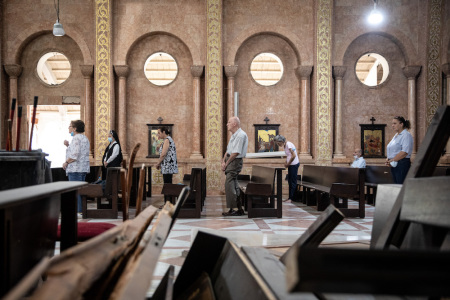Lebanon, a haven for Christianity, on the brink of collapse if world fails to act, experts warn

Lebanon, known as a haven for Christianity in the Middle East, is on the brink of financial collapse and teeters on the edge of failed-state status if its path is not quickly reversed, an expert roundtable hosted by a leading Middle Eastern Christians advocacy group warned.
“Lebanon is moving rapidly towards total state failure. Full collapse would take weeks to unfold but decades to repair,” former U.S. Ambassador Ed Gabriel, the president of the American Task Force on Lebanon, said during a media roundtable hosted by In Defense of Christians last Friday.
Richard Ghazal, a senior advisor for IDC, a nonpartisan Washington-based grassroots human rights organization, said Lebanon will not remain “the final remaining bastion of Christianity in the Middle East” if immediate action does not take place to reverse the country’s downfall.
The explosion in Lebanon’s capital city of Beirut on Aug. 4 led to over 200 deaths, thousands of injuries and the destruction of over 300,000 homes. The explosion worsened Lebanon’s financial and humanitarian crisis as the country with nearly a 40% Christian population was already in a state of decline.
The Lebanese prime minister resigned days after the deadly explosion and the protestors alleged the government was guilty of negligent handling of the explosives that triggered the blast.
Before the fatal blast, nearly 1 million people in the Beirut area could not afford basic living essentials such as food, clothing and shelter. Around and 60% of citizens live below the poverty line due to political corruption and negligence, according to IDC.
Lebanon, a country with a population of around 6.8 million, shares borders with Israel and Syria.
Though it was once a financial capital in the Middle East, recent events, government corruption and the destabilization of its currency are causing international banks to flee as it is in a financial crisis.
Foreign lenders such as HSBC and Wells Fargo are removing themselves from Lebanon’s central bank, while Bank of America and Deutsche Bank have reduced activities in Lebanon. The prevalence of Iran-backed militant group Hezbollah makes the country’s banks increasingly risky for international lenders.
Bishop Peter Karam, the patriarchal vicar and titular bishop of Acre of Phoenicia of the Maronites, said part of Lebanon’s financial crisis is due to the amount of corruption in the government. He compared the financial system’s mismanagement as a “Ponzi scheme.”
“We must admit the fact that there is a lot of corruption in Lebanon. A lot of corruption in Lebanon financially, politically, socially. … The collapse of the financial institutions in Lebanon is a very complex issue. …,” Karam said. “The financial sector in Lebanon was a model in the region for a lot of years. The country was known as the Switzerland of the Middle East. But now it’s just nonexistent because of mismanagement, corruption and political interference in the workings of the central bank and the financial sector.”
Ghazal said the whole world would feel the effects of Lebanon’s failure if it collapses.
“The Lebanese people cannot buy food or even the basic life essentials. So make no mistake about it, a total collapse in Lebanon will send economic humanitarian and even national security ripple effects around the region and then across the globe,” Ghazal explained.
Ghazal said the international community must respond to Lebanon’s worsening crisis through a United Nations-led summit to “re-chart its course going into the future” and restore its founding values of egalitarianism, accountability, the rule of law.
“We often hear the phrase, ‘eternal vigilance is the cost of freedom,’ well that’s never been more true than today in the case of Lebanon,” Ghazal said.
The panelists agreed that the international community must respond to Lebanon’s worsening crisis with a non-corrupt, reform-minded government.
Stabilizing the currency will be a first step in the right direction, Gabriel, the former U.S. ambassador to Morocco, said.
Gabriel recommended a “solid diplomatic effort” and an international conference led by the U.S. and France to provide humanitarian effort and stabilized armed forces.
Robert Nicholson, president of the Philos Project, a Christian advocacy group in the Near East, said the country’s geopolitical importance means its impending downfall would cause a ripple effect of ramifications across Israel, the U.S. and Europe.
“Lebanon is uniquely linked to the West,” Nicholson explained. “It’s part of the Arab world, but it’s just as much a part of the Western world. I sometimes think of Lebanon as kind of a ceasefire zone between these two worlds or civilizations or cultural-religious blocks.”
He said Lebanon is on the “seam line between the Christian West and the Islamic [Near] East.”
“We talk a lot about, as Christians, the importance of this country to the [Christian] who live there. But Lebanon is just as important for the Muslims who live there and their co-religionists throughout the region,” Nicholson contended. “What happens in Lebanon affects the Christians, yes, and I am very concerned about that as a Christian. But it also affects many Muslims.”






















